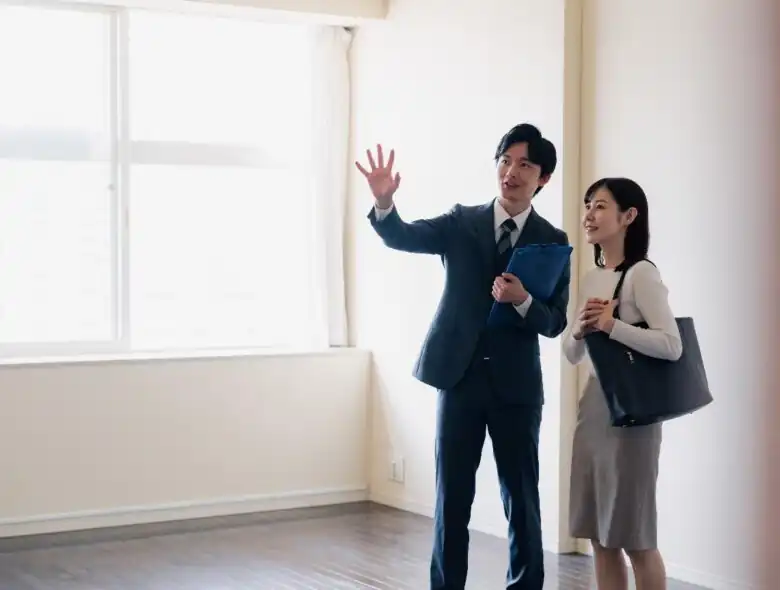Many people dream of moving away from their parents and living alone with the freedom to do whatever they want. However, when it comes to ensuring your first time living alone goes smoothly, it can be hard to know what to do.
In this article, we will explain what you should confirm with your real estate agency, important things to be aware of, and key points to check when viewing a property. Please use this as a reference.
At Village House, there are no security deposits, key money, handling fees, or renewal fees. If you want to save money when moving, please check out our website.
Things you should ask a real estate agent when searching for an apartment

When you visit a real estate agency, here are some things to check.
- The schedule from property viewing till contract signing
Make sure to confirm the approximate schedule from viewing the property till signing the contract. In some cases, you may not be able to move in immediately due to certain circumstances, e.g., perhaps the previous tenant has not moved out yet or the new property is still under construction. If you’re not clear on the schedule, you might not be able to move in by your desired date, so be careful.
- Necessary costs and timing of payment
Even if you plan to pay the initial costs with a credit card, some real estate agencies may only accept bank transfers. Therefore, once you receive the estimate, make sure to check the breakdown of costs, as well as confirm the payment method and deadline.
- Most suitable floorplan and desired area
If you’re unsure about which layout is best for you or which area you should live in, please consult with your real estate agent. Let them know that it is your first time living alone and that you would like some guidance. The agent will kindly give you some advice.
- Issues or problems within the property
If you find a property you like, ask about any potential issues, such as issues with the neighbors or complaints about noise or shared spaces. It’s a good idea to check whether there are any troubles in advance so that you don’t regret moving in afterward.
- Condition and usage of home appliances
Check the condition of appliances such as the air conditioner and intercom. If an appliance is too old, try to negotiate for it to be replaced. Additionally, if you have any questions about how to use an appliance or if you are unclear about anything, make sure to ask beforehand to avoid any issues after you move in.
- Environment of surrounding stores and public facilities
Check how far the apartment is from nearby facilities such as convenience stores, supermarkets, drugstores, and hospitals. Also, if there are any specific public facilities you would like to use, it is a good idea to ask whether they are located nearby.
- Safety and atmosphere of the neighborhood
The safety of an area has a big impact on how comfortable it is to live there. Poor security can increase the risk of becoming involved in crime and cause daily anxiety.
Therefore, it’s a good idea to check with the real estate agent about the crime rate, the state of the downtown area, and whether the atmosphere of the area changes between day and night. This will help ensure your peace of mind.
- Whether a guarantor is required
Check early whether a guarantor is required. If a guarantor is needed, you might be asked to provide documents such as the guarantor’s seal registration certificate, official seal, ID, income certificate, and resident card (original).
The requirements will vary depending on the real estate agency and gathering these documents may take some time, so check early on whether a guarantor is required.
Steps to take when visiting a real estate agency

Step 1: Make an appointment with the agency
When you go to a real estate agency, make an appointment in advance by phone or through the contact information on their official website. You can still get help without making an appointment, but you might have to wait for some time.
Step 2: Fill out a questionnaire and undergo an interview at the agency
After arriving, you will be asked to fill out a questionnaire and be interviewed about your desired area, budget, and any non-negotiable conditions. The agency will then search for properties that match your preferences.
Step 3: Get introduced to the property and schedule viewings
If a property catches your interest, you will be invited for a viewing. While viewings may be possible on the same day, they might also be scheduled for a later date. During the viewing, be sure to check the points described later on before deciding whether to proceed with an application.
Step 4: Apply for the property and undergo a tenant screening
If there are no problems with the property after the viewing, you can apply to rent it. You will then need to provide the required documents and undergo a tenant screening.
Step 5: Sign the rental contract and pay the initial costs
Once you pass the tenant screening, you will sign the rental contract and pay the initial costs.
Step 6: Receive the keys and move in
On your move-in day, you will receive your keys and begin moving in.
Points to check when viewing the property

- Check the floor plan and size of the room when furnished
An empty room may seem spacious and easy to decorate, but in reality, actual limitations may arise due to the location of electrical outlets, windows, and walls. As such, imagine how the room will look when furnished and consider whether you will have enough space for moving around.
- Verify that the amenities match the description
There may be cases where the expected amenities are not present, or they differ from what you had imagined. If you are unsure about the functionality of the equipment compared to the information you had in advance, confirm with your real estate agency.
Additionally, if there are any facilities not listed in the property details (or the contract), be aware that you may have to cover the repair or replacement costs if they break.
- Check the drainage in the kitchen, bathroom, and toilet
For water-related areas, it’s important to check not only the cleanliness but also the drainage flow and any odors. Make sure to run water and thoroughly inspect the drainage conditions.
- Check for any bothersome noise
Pay attention to sounds like talking, footsteps (inside and outside), door movements, and ventilation noise. If the rooms above, below, or next to yours are vacant, ask your agent to let you enter those rooms to assess better how sound travels. Additionally, if the building is facing the main road or is located near a large commercial facility, be aware of potential noise from outside.
- Check the condition of shared spaces
The condition of shared spaces reflects the quality of management. Specifically, make sure that the entrance, mailbox, bicycle parking area, corridors, staircases, elevators, garbage collection points, etc. are kept clean and well-maintained.
Important points to consider when signing a contract

Carefully review the restoration clause
When renting an apartment, the tenant has an obligation to restore the property to its original condition when moving out.
The obligation to restore the property to its original condition does not mean returning the property to its original condition before it was rented, but rather repairing wear and tear that exceeds normal use. However, there are cases where restoration clauses set conditions that go beyond the standard.
If you feel that the conditions are too burdensome, it’s important to discuss revising the terms before signing the contract or consider finding another apartment if necessary.
Check for penalties and prohibited activities
- Penalty for mid-contract termination
In properties with no security deposit or key money, or with free rent offers, there may be a fixed contract period, and mid-contract termination could result in penalties. Be sure to confirm this before signing the contract.
- Prohibited activities
Check whether keeping pets, playing musical instruments, using kerosene stoves, cohabitation, or room sharing are permitted.
- Conditions for contract termination
If you fail to pay rent or carry out any prohibited activities, you may receive a notice of contract termination. Be sure to check the specific conditions under which the contract may be terminated.
- Rules for giving a moving-out notice
Confirm how many months in advance you need to give notice before moving out, and whether it’s possible to notify by phone or if a written notice is required.
- Renewal fees
Check the room renewal fees, renewal handling fees, fire insurance renewal fees, and if you’re enrolled with a guarantor company, confirm the renewal fees for the guarantor as well.
At Village House, we offer over 1,000 properties nationwide at affordable prices. If you’re looking for a place to live alone, please feel free to consult with us.
Related articles:
- What to Expect from an Apartment Tour in Japan and Tips on How to Make It a Success
- A Foreigner’s Guide to Renting in Japan: Common Pitfalls to Avoid
- The Cheapest Prefectures to Live in Japan
- Guide to the Apartment Lease Signing Process
- All the Documents You Need when Signing a Rental Contract and Applying for an Apartment

Hello, I’m Machiko Doi, a freelance writer who writes about housing and living in Japan.
I live in an 80-year-old house that I inherited from my grandparents along with my two shelter cats and daughter.
We live a relaxed life while repairing the house.
I like to cook vegetables from the garden and fresh fish caught by my father, and enjoy them with cold beer on a hot day or hot sake on a cold day.



